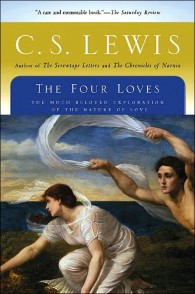C. S. Lewis on the joy and the richness of friendship …

Few books reward close reading—and rereading and reading yet again—as richly as does C. S. Lewis’s The Four Loves. Each of the “four loves”—affection, friendship, Eros, and charity—has fallen on hard times in our modern world, something Lewis had begun to recognize as he wrote the four essays some five decades ago.
For example, the topic of “friendship in a digital age” is becoming an increasingly common topic of conversation. Alone Together: Why We Expect More from Technology and Less from Each Other by MIT Professor Sherry Turkle was published in January 2011. More recently, a profound reflection on the state of friendship in our digital age was written by William Deresiewicz, author and former English professor at Yale University.
Friendship is devolving … from a relationship to a feeling—from something people share to something each of us hugs privately to ourselves in the loneliness of our electronic caves, rearranging the tokens of connection like a lonely child playing with dolls.
What friendship is devolving into is rather different from what it was in both the more recent and the more ancient pasts. Lewis wrote that “To the Ancients, Friendship seemed the happiest and most fully human of all the loves; the crown of life and the school of virtue.” In an age where “actual connection” has been replaced by the “‘sense’ of connecting” described by Deresiewicz, C. S. Lewis paints a rather alluring portrait of “actual friendship.”
In a perfect Friendship this Appreciative love is, I think, often so great and so firmly based that each member of the circle feels, in his secret heart, humbled before the rest. Sometimes he wonders what he is doing there among his betters. He is lucky beyond desert to be in such company. Especially when the whole group is together; each bringing out all that is best, wisest, or funniest in all the others. Those are the golden sessions; when four or five of us after a hard day’s walk have come to our inn; when our slippers are on, our feet spread out toward the blaze and our drinks are at our elbows; when the whole world, and something beyond the world, opens itself to our minds as we talk; and no one has any claim on or any responsibility for another, but all are freemen and equals as if we had first met an hour ago, while at the same time an Affection mellowed by the years enfolds us. Life — natural life — has no better gift to give. Who could have deserved it? …
As Lewis continues, the saying “the more the merrier” comes to mind. The addition of new members to a small circle of friends multiplies rather than divides the richness of the friendships—assuming the newcomer is “qualified to become a real friend.”
In each of my friends there is something that only some other friend can fully bring out. By myself I am not large enough to call the whole man into activity; I want other lights than my own to show all his facets. Now that Charles is dead, I shall never again see Ronald’s reaction to a specifically Caroline joke. Far from having more of Ronald, having him ‘to myself’ now that Charles is away, I have less of Ronald. Hence true Friendship is the least jealous of loves. Two friends delight to be joined by a third, and three by a fourth, if only the newcomer is qualified to become a real friend. They can then say, as the blessed souls say in Dante, ‘Here comes one who will augment our loves.’ …
We possess each friend not less but more as the number of those with whom we share him increases. In this, Friendship exhibits a glorious ‘nearness by resemblance’ to Heaven itself where the very multitude of the blessed (which no man can number) increases the fruition which each has of God. For every soul, seeing Him in her own way, doubtless communicates that unique vision to all the rest. That, says an old author, is why the Seraphim in Isaiah’s vision are crying ‘Holy, Holy, Holy’ to one another (Isaiah 6:3). The more we thus share the Heavenly Bread between us, the more we shall all have.
In these excerpts from The Four Loves, the mention of “Charles” is a reference to Charles Williams and “Ronald” refers to J. R. R. Tolkien. The Four Loves may be purchased here and is available online here.
“Faux Friendship,” by William Deresiewicz, was published in The Chronicle of Higher Education.


 June 4, 2015
June 4, 2015 







Comments are closed.